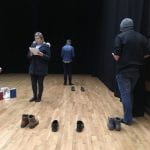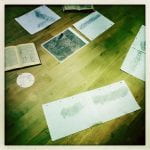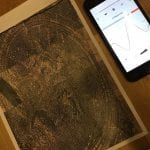By Dr Siobhán O’Gorman (Senior Lecturer – College of Arts) – Staff Profile & Dr Michael Pinchbeck (Principal Lecturer – College of Arts) – Staff Profile
In Winter 2017, MA Drama students from University of Lincoln (UoL) and MA Performance students from York St. John University (YSJ) collaborated as part of an ‘exchange project’ in each other’s cities responding to the architecture, history, geography, topography and psycho-geography of the landscape. John Berger wrote that to understand a landscape we have to situate ourselves in it. Taking this as its aim, Inspiring Cities took place over one weekend in York and one day in Lincoln and involved walking, talking, writing, making and reflecting. It culminated in a sharing of work at LPAC on Wednesday 6 December 2017 followed by a ‘Swan Salon’ – a recent innovation of MA staff and students in LSFPA where we meet for a drink every month to talk about art.
This was a unique exchange project sparked by a desire to take students out of their ‘comfort zones’ – the pedagogical challenges faced included designing a workshop that could speak to 8 students from two different learning climates with two different sets of learning objectives. However, the benefits were many, including team-working, confidence-building and catalysing a way of theatre-making and performance writing that has inspired their work since. There has been a noticeable development in the creative writing of the MA Drama students here and the York students will also incorporate some of the material into their final performances.
 Dr Claire Hind, from York St John University, said “What an exciting exchange with the University of Lincoln. It was an extremely valuable learning experience offering opportunities for students to share their growing postgraduate practice, discuss in detail the compositional strategies they are currently developing, think critically and with others about performance making and learn from students outside their own institution. It was a pleasure team teaching with Siobhán and Michael too, and we were all invigorated by the sheer creativity of such a generous teaching and learning environment.”
Dr Claire Hind, from York St John University, said “What an exciting exchange with the University of Lincoln. It was an extremely valuable learning experience offering opportunities for students to share their growing postgraduate practice, discuss in detail the compositional strategies they are currently developing, think critically and with others about performance making and learn from students outside their own institution. It was a pleasure team teaching with Siobhán and Michael too, and we were all invigorated by the sheer creativity of such a generous teaching and learning environment.”
As part of the project, the students designed and delivered an alternative tour of their city. Each group met the other at the train station and took them on a journey around the city showing them sites of significance to them. For example, the York students met us at the train station with a bunch of flowers which they would later leave at the door of a closed nightclub. Lincoln students took the York students to The Collection, the Castle and the Cathedral and spoke about Steep Hill as the spine of the city. The tour ended with us having a Bratwurst at a Christmas stall. Though staff led to start with, the end results were entirely student-driven and co-authored.
The project enabled MA Drama students from UoL and YSJ to de-institutionalise their learning and use both cities as their stimuli. It enabled innovative, site-responsive practice to lead to a creative collaboration and interdisciplinary skills exchange. Innovation was developed through different combinations of team teaching that enabled cross-pollination across artform and institution. The most striking innovation was for MA students to work with peers from another university as a creative catalyst. The project responded to informal discussions with MA graduates about how they sought to be more ‘joined up’ with other universities to boost employability and research profile. It invited collaboration with MA Students from YSJ and encouraged an interdisciplinary dialogue which will inform students’ future work and potential collaborations between all involved. There is already talk of the students continuing to work together and a shared appetite for a repeat project next year.
This practice-based exchange project has enhanced participants’ abilities to think and reflect through making performance work and writing for performance. It provided them with opportunities and encouragement to make work, and to enhance the conceptual, reflective and technical strategies that they employ in their practice at MA level. The project recognises the deep interrelationship between critical reflection and production and was designed to deepen skills and knowledge in relation to models and strategies of performance practice as well as to encourage collaboration. Participants were invited to respond to stimuli and inspiration that direct and inform their work in the current climate of performance practice as well as the stimuli that each city provides – cityness.
Innovations included the students working remotely in each city and sending text messages to hint at their location for staff to track them down. Google maps helped the students to transpose Lincoln onto York and vice versa. Mobile phones were used to take images, video and audio which were then brought back into the studio to fold into their final performance. Students were actively involved in evaluating the success of the project and its impact will be measured by their experience. Their feedback was unanimously positive – see the blog post by one of the participants here. Staff have also commented that the project reminded us ‘why we do what we do’. If the project was to repeat next year, then it would be helpful to have more time together – perhaps a week – as the relationship had just started to take shape before we had to end the project. It would also be a good idea to have a pre-existing blog set up for all students to document the project. However, this is a dot dot dot not a full stop and we hope it will serve as a model for future iterations of the exchange project and others like it.



